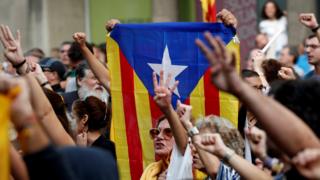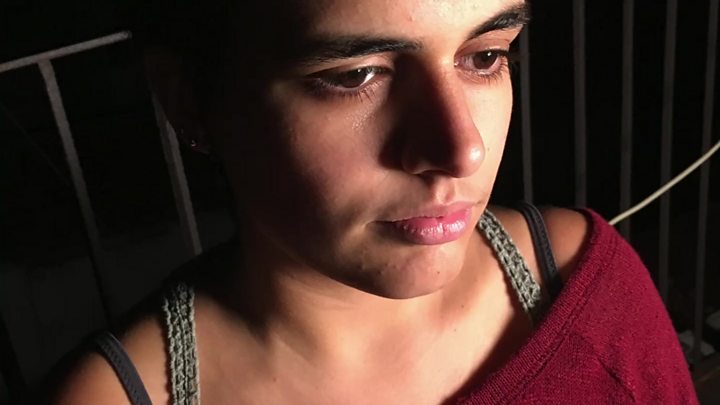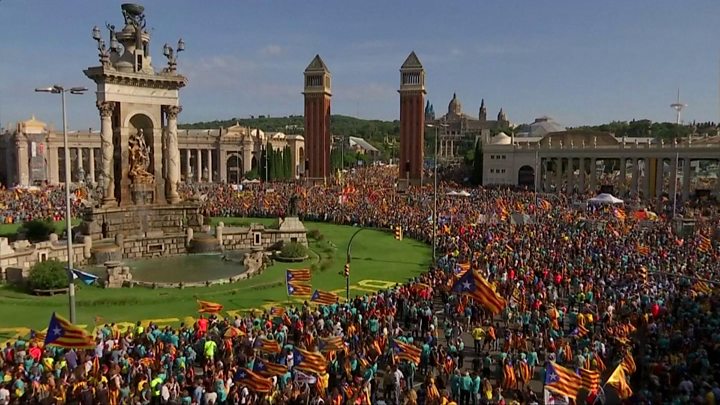 Image copyright Reuters
Image copyright Reuters Spain’s Supreme Court has sentenced nine Catalan separatist leaders to between nine and 13 years in prison for sedition over their role in an independence referendum in 2017.
Three other defendants were found guilty of disobedience and fined, but will not serve prison sentences.
The 12 politicians and activists had all denied the charges.
Separatists in Catalonia were planning mass civil disobedience ahead of the verdict.
Carles Puigdemont, the former Catalan president who escaped trial after fleeing Spain before he could be arrested in 2017, said the sentences handed to separatist leaders of “100 years in total “were” an atrocity “.
“Now more than ever … it is time to react like never before, “he wrote on Twitter, adding:” For the future of our sons and daughters. For democracy. For Europe. For Catalonia. “
(The prosecution had sought up to 25 years in prison for Oriol Junqueras, the former vice-president of Catalonia and the highest-ranking pro-independence leader on trial.
Junqueras was handed the longest sentence of 13 years for sedition and misuse of public funds.
The other sentences ranged from nine years upwards.
The nine leaders were acquitted of a more serious charge of rebellion.
Following the court’s verdict, Catalan independence supporters marched in Barcelona displaying banners that read “free political prisoners” while urging others to “take to the streets”.
Over the weekend, hundreds of protesters rallied in the city.

Media playback is unsupported on your device
In 2017, police and protesters clashed in the streets when Catalonia’s pro-independence leaders went ahead with a referendum ruled illegal by Spain’s constitutional court .
Monday’s ruling comes after four months of hearings.
During their closing arguments in June, defense lawyers told the court their clients denied the charges of rebellion and sedition, but admitted to the lesser charge of disobedience, which could have seen them banned from public office but avoiding prison.
Who are the 12 Catalan leaders?
Some held prominent positions in Catalonia’s government and parliament, while others were influential activists and cultural advocates.
Before the trial ended, the 12 defendants were each given 15 minutes to present their arguments to prosecutors on the final day on (June.)
They told the court in Madrid they were victims of an injustice in a trial built on “false” charges:
What they said in their defense
- Oriol Junqueras, former vice-president of Catalonia: “Voting and defending the republic from a parliament cannot be a crime.”
- Jordi Cuixart, president of Catalan language and culture organization Òmnium Cultural: “What we did on 1 October [holding the 2017 referendum] was an exercise of collective dignity.”
- Carme Forcadell, ex-speaker of the Catalan parliament: “I didn’t take part in any strategy, I restricted myself to fulfilling my duties as parliament speaker.”
- Jordi Turull, former Catalan government spokesman: “We weren’t looking to involve people [in the bid for independence], that already existed, and so a political solution had to be provided.”
- Joaquim Forn, former Catalan interior minister: “I defended the referendum as a politician, but told Catalan police to follow court orders.”
- Jordi Sànchez, activist and ex-president of the Catalan National Assembly: “I am the victim of an injustice – there are no ideas or principles that should be silenced.”
- Raül Romeva, former external relations minister: “There is no international treaty prohibiting the right to self-determination. Not even the Spanish Constitution.”
- Dolors Bassa, ex-labor minister: “It was always clear to us that if a lot of people turned out to vote, it would help us when negotiating [with Madrid] … independence was always seen as something to be agreed. “
- Josep Rull, former territorial minister: “People vote and it’s good that parties deliver … our manifesto was not challenged in court.”
- Carles Mundó, former justice minister: “The vote was not paid for with public funds, I saw [it] as a political protest.”
- Meritxell Borràs, former governance minister: “[The vote was] a political expression [that] held no legal consequences.”
- Santi Vila, former business minister: “I saw the referendum as a political protest.”
Nine of the defendants had already spent months in pre-trial detention. The remaining three were earlier released on bail.
How did they end up in court?
Prosecutors argued that the unilateral declaration of independence was an attack on the Spanish state and accused some of those involved of a serious act of rebellion.

Media playback is unsupported on your device
They also said that separatist leaders had misused public funds while organizing the 2017 referendum.
Prosecutors argued the leaders had carried out a “perfectly planned strategy … to break the constitutional order and obtain the independence of Catalonia” illegally.
Forcadell, the former parliament speaker who read out the independence result on (October) , was also accused of allowing parliamentary debates on independence despite warnings from Spain’s Constitutional Court.
Some of the leaders, speaking to the BBC ahead of the trial, said the proceedings were political in nature. Any violence, they said, was on the part of police and committed against voters in a crackdown which made headlines around the world.
Three weeks after the banned 2017 vote, the Catalan parliament declared an independent republic.
Madrid stepped in to impose its rule on the region, and several Catalan leaders fled or were arrested.
What is behind the Catalonia controversy?
Catalan nationalists have long complained that their region, which has a distinct history dating back almost 1, 000 years, sends too much money to poorer parts of Spain, as taxes are controlled by Madrid.

Media playback is unsupported on your device
The wealthy region is home to about 7.5 million people, with their own language, parliament, flag and anthem.
In September, a march in Barcelona in support of Catalonia’s independence from Spain drew crowds of about 600, 000 people – one of the lowest turnouts in the eight-year history of the annual rally.







GIPHY App Key not set. Please check settings